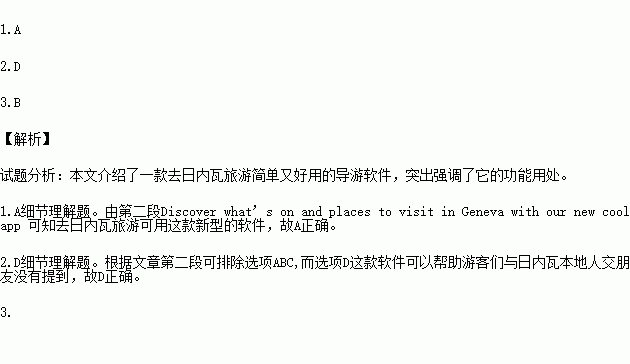题目内容
Geneva(日内瓦)Tourist Guide
* Universal compact app for iPhone 6 / iPhone 6 Plus / iPhone 5 / iPhone / iPod / iPad GENEVA TOURIST GUIDE with attractions, museums, restaurants, bars, hotels, theatres and shops with traveler reviews and ratings, pictures, rich travel information, prices and opening hours.
Discover what's on and places to visit in Geneva with our new cool app. It will guide you to top attractions and shopping malls, and tell you directions to hotels, bars, and restaurants. This is an all-in-one app for all the local attractions. Our travel guide to Geneva features up-to-date information on attractions, hotels, restaurants, shopping, nightlife, travel tips and more.
Highlights :
◆ Geneva Information -- Overview, climate, geography, history and travel
◆ Attractions -- Ancient sites, beaches, botanical gardens, coffee farms, museums, scenic drives, towns, waterfalls, religious and historical sites, etc.
◆ Hotels -- From luxury hotels to budget accommodations, including reviews, price comparison, address and more.
◆ Map -- It is an interactive map and get turn-by-turn driving directions. Find traffic details, road conditions, street maps, multi map, satellite photos, and aerial maps. Allow you to easily search and find local businesses with directions.
◆ Gallery -- Picture galleries of Geneva's most beautiful sights, interesting events, unusual occasions and more.
◆ POI Search -- Search everything at Geneva.
Enter any keyword or name to search. Find Name, address, distance, route map, call, and directions to every business location.
◆ Translator - Supports 52 languages, Large text Translation.
◆ World Clock - All major cities of the world (1000 Cities).
1. What is Geneva Tourist Guide?
A. An app B. A book C. A map D. An advertisement
2. Which of the following Geneva Tourist Guide can’t help tourists?
A. To discover what’s on and places to visit in Geneva
B. To guide tourists to top attractions and shopping malls
C. To offer latest information on attractions in Geneva
D. To help tourists make friends with Geneva locals
3.Which of the following is not among highlights of Geneva Tourist Guide?
A. Information about both expensive and cheap hotels in Geneva
B. Chances to visit Geneva galleries without paying any money
C. A search system that can find everything at Geneva
D. Being able to be used by tourists from all over the world



 other to build strong bodies.
other to build strong bodies.